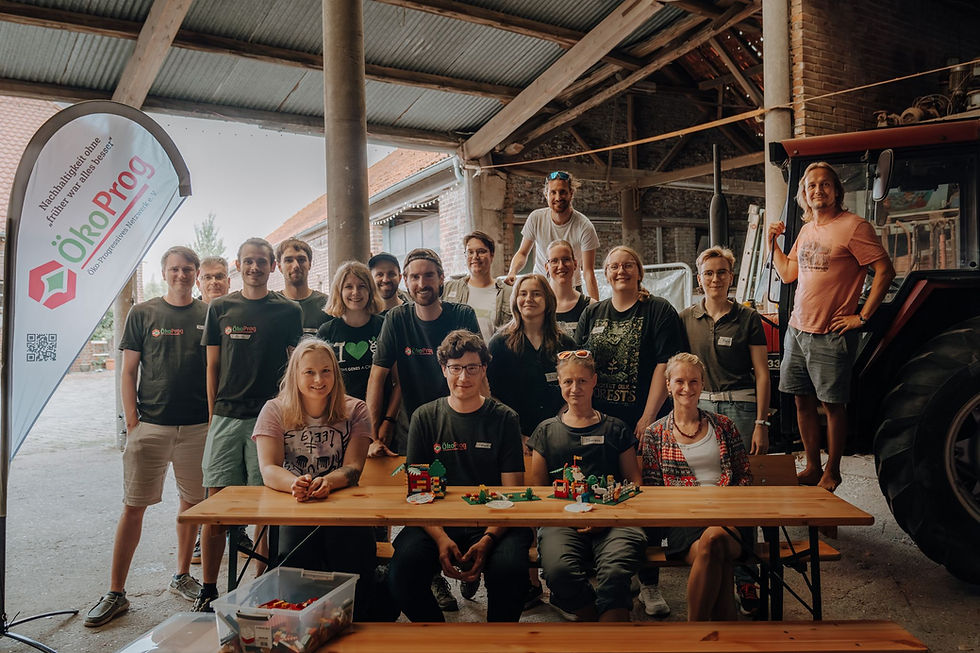Transforming Agroecosystems Together
- Taskscape Associates
- May 19, 2025
- 3 min read
Updated: Sep 11, 2025
FRAMEwork holds global knowledge exchange event in Prague...
We're pleased to share that consortium partner the Czech University of Life Sciences recently hosted a hybrid conference for FRAMEwork, bringing project participants together with key stakeholders to explore collective approaches to improving farmland biodiversity at a landscape-scale.

Overview
"Transforming Agroecosystems Together", 13-15 May 2025, took place around our final Annual Meeting and General Assembly, sharing five years of project insights and outputs with attendees, as well as advertising further webinars and outputs upcoming before project end. It was organised as part of the 'Recodo In Real Life' Event Series, associated with the project's online knowledge, action and legacy platform which hosts key outputs. The conference formed a leading contribution to the project's delivery of an International Scientific Stakeholder Congress (D1.10) through a distributed events series. So the project was pleased to successfully facilitate knowledge exchange on collective approaches to enhancing farmland biodiversity across continents and sectors, with 50 external log-ins to webinars over three days of sessions.
"This has been very enlightening for me and a lot of the work shows opportunities for collaboration with the work we are doing on multifunctional landscapes under the CGIAR science program. Thank you presenters and organizers."
~ Online attendee, International Water Management Institute (IWMI)
Feedback during and after the event was positive, with the project's attending officer from the EU's Research Executive Agency offering congratulations and commenting that it was "very interesting and impressive to see all the work being done". Please find more on engagement and impact at the end of this blog, along with where to access the program of sessions and their slides yourself!
Event Program
Hybrid sessions on May 13th opened with the project diving into the Farmer Cluster model underpinning FRAMEwork. Dr Graham Begg (Project Coordinator, James Hutton Institute) provided a project overview, with Neville Kingdon tracing the history of 'Farmer Clusters' to contextualise Dr Niamh McHugh's introduction of FRAMEwork's new Advanced Farmer Cluster network (Game and Wildlife Conservation Trust). In-field insights came from Cluster Facilitators Jan Travnicek (Czech Organics ) and Aliyeh Salehi (BOKU Vienna), with Theo Simmons (Taskscape Associates) wrapping up with interview excerpts sharing perspectives from additional Facilitators and Farmers across the project unable to attend.

Wednesday morning was focused on showcasing practical tools: Dr Niamh McHugh presented on project training materials and guidelines, Gerid Hager on citizen science engagement strategies (IIASA) and Lisette Cantu on biodiversity monitoring tools (LIST). The morning then closed with attendees enjoying an introduction to the innovative FEAST farmland assessment tool from Doug Warner and John Tzilivakis at the University of Hertfordshire. Afternoon sessions turned to the broader contexts of digital knowledge exchange with Lindsay Crockett (IIASA) and Theo Simmons introducing Recodo and Berta Giralt (CREAF) discussing the Data Hub created for accessing and using project data. Day two wrapped up with a discussion on digital challenges, opportunities and gaps.
The final day zoomed out to explore wider contexts. Trinity Ndlovu (James Hutton Institute) offered a systems perspective, while Camilla Moonen (Sant'Anna) tackled land abandonment and Laura Mansier (University of Amsterdam) explored habitat modelling for natural pest control. Turning to financial valuations, Simone Martino (James Hutton Institute) discussed natural asset profiling, with the University of Osnabruck's Thomas Rellensmann and Moritz Fritschle exploring public incentives and green financing. Professor Iris Bohnet (Czech University of Life Sciences Prague) zoomed out to analyse Farmer Cluster success factors, before Dr Niamh McHugh and Rachel Nichols shared project biodiversity assessment results and sustainability methodologies (Game and Wildlife Conservation Trust). The event came to a close with presenters and attendees discussing challenges and opportunities across all topics.
Engagement and Impact
Thirty two registered project participants attended the conference. Following release of the final programme, the webinars achieved international reach through partner Taskscape's organic and paid promotion via two weeks of LinkedIn and email campaigns. These went out to project subscribers and external mailing lists created for FRAMEwork. Overall, ninety-four external registrants signed up for sessions and post-event dissemination materials. Curious? You can access the program and slides from the event here.
External registrants represented a diverse mix of target stakeholders with over half (52.1%) registered from research organisations, followed by NGOs (27.7%), private sector representatives (12.8%) and policymaking or advisory organisations (7.4%). Their geographic distribution also supported the event's international scope with 32 countries represented. While Europe was the main audience location at 73.4%, the event also attracted registrations from North and South America (5.3%), Asia (8.5%), Africa (11.7%) and international organisations.
If you're interested in joining one of FRAMEwork's free webinars yourself, we warmly invite you to explore the calendar and sign up to those remaining today!



